Two Point Museum turns a fresh slice of mundane life into a wacky British adventure
Funny bones.
What impressed me most about Two Point Studios' previous games was how far they flourished from a single concept. The simple seed of a hospital setting, and then a campus, were able to offer such a depth of systems, such a variety of gameplay - and of course a whole load of gags.
That's just as true with the newly-announced Two Point Museum, where, as the title implies, players are tasked with creating and managing a museum of historical exhibits. But, this being a Two Point game, things aren't as simple as they may first seem. Think Night At The Museum, but with zany and sarcastic British humour.
Designing a museum, decorating exhibits, adding gifts shops full of tat, providing restaurants, and seeking donations. All the obvious boxes have been ticked, but these alone would be mundane. Because of course, here in the world of Two Point County, exhibits aren't just a handful of bones but opportunities for discovery, as well as potential disaster.
Yet with all the possibilities of sim management games set in the wacky fictional world of Two Point County, why settle on a museum?
"We've got a list of lots of different ideas we consider for future games," design director Ben Huskins tells me as I sat down to play a brief demo of Two Point Museum. "The thing that really got us excited about Museum when we first started talking about it was this idea of building up these collections of these amazing artefacts... How do I get these amazing things to find and display in my museum? That immediately sparked lots of ideas with us."
"All the exhibits are really meaningful and have lots of gameplay integrated, which gave us quite a lot of flexibility," adds executive producer Jo Koehler. "We're seeing more than the previous games where people are building up their museums, they look genuinely unique because as soon as we got past the gameplay, we really pushed into the how do we get these museums feeling and looking amazing and incredible?"
Two Point Museum begins with the basics of item placement and decoration, as well as staff hires, but soon branches out. Firstly, creation is no longer restricted by rooms as in previous games. Now, partition walls can be used to provide structure and creation is far more free-form than before, with new floor and wall options, archways, decorative items, and visuals that focus on lighting each space.
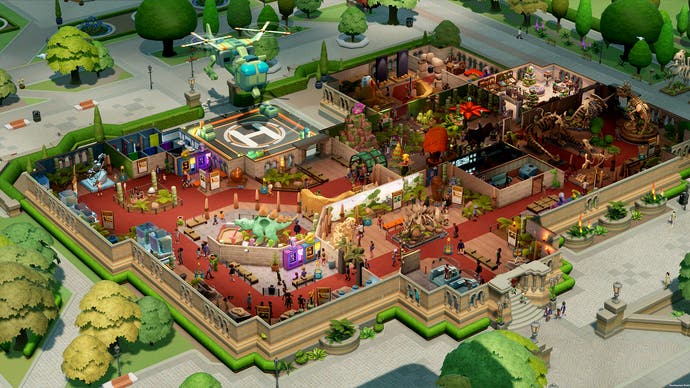
Moreover, Two Point is branching further outside with expeditions. Exhibits aren't simply bought from a menu like hospital or school equipment would be; instead they must be excavated on trips across a gradually-unveiled world map and brought back to each museum's helipad. Experts are hired not only to keep exhibits in top shape, but to fly off on adventure at players' request and bring back new, exciting objects to display. A giant crate bobs and pops open to reveal your latest prize - it's like a fossil gacha machine.
Of course, this could bring disaster as much as joy. One expert came back from a trip with an illness and trod muddy footprints across the pristine floors of my museum. Two Point hinted even more tragic events could occur. Experts may even perish while away.
Expeditions are a key way the studio is advancing gameplay over previous games, with exploration and discovery not usually seen in the sim genre. It adds an extra layer of adventure and storytelling but also strategy, Huskins explains, as players will need to choose wisely which experts to send on expeditions and which to remain in the museum.
This demo focused solely on the prehistoric exhibits (the "starter pack," says Huskins), which required expeditions to the Bone Belt for excavation. Still, even these exhibits may not be what you expect. Yes there are dinosaurs - the likes of the Sharpontops and the Tugowaurus - but also a caveman preserved in ice who threatens to come alive, a fossilised future adventurer (thanks to time travel, naturally), and a giant, stone prehistoric computer. There's even a fossilised floppy disc, because our childhood is museum-worthy nowadays. Dinosaurs, in particular, are collected in parts with multiple fossils required to complete the set. It's a bit like Animal Crossing, as is the collection where players can complete the full suite of items from each exhibit set. I doubt the cafe has a pigeon serving customers, though.
What other themes are on the way? Two Point is naturally keeping tight-lipped, although I did spot some aquarium facilities in the game's trailer.
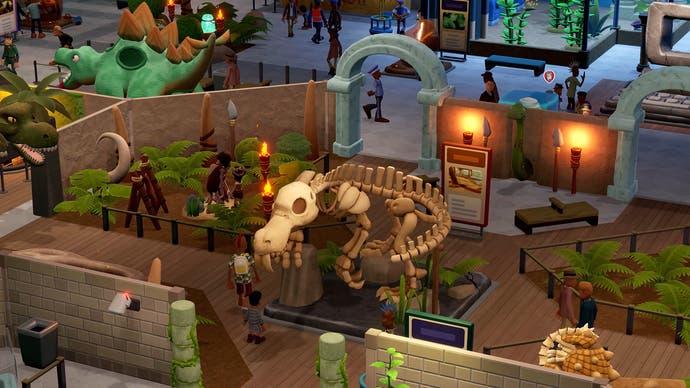
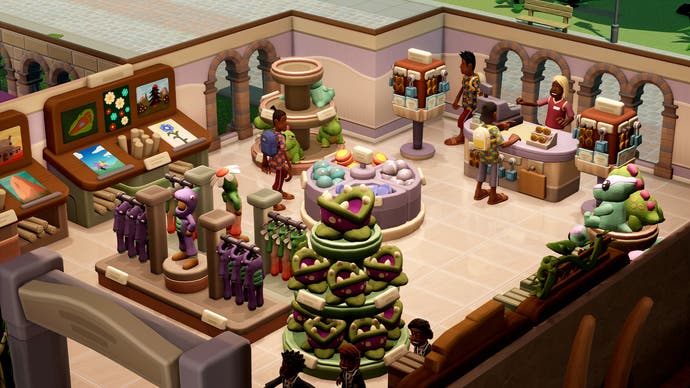
"We have some stuff that is grounded in reality," says Huskins, "so we obviously look at what are the sorts of things people would expect to see in a museum, because we always want that grounding. But then we have those slightly more out-there things that make sense in the world of Two Point County."
He points to previous games and lore implications for hints of what may be yet to come. "It's about getting that variety, both in terms of what these cool exhibits look like but also how they behave and how the player interacts with them."
Personally, I'm hoping for an art gallery where you're tasked with preventing soup-throwing vandals and heists. "Stay tuned," Huskins hints.
Two Point Museum has something far more frightening than dinosaurs though: children. Visitors will arrive in groups, including pesky kids who will run riot without proper entertainment. I noticed one climbing all over one of my precious fossils but was sadly unable to swat it away. Later, the game will introduce school trips and players will be able to plan tours to highlight their most precious possessions.
The inclusion of children is another way the studio is developing the genre, along with other new visitor types. Key to their "edutainment" is the workshop, which will allow players to create interactive displays, be that a dinosaur climbing frame or similar, and prevent them causing a nuisance. School trips will also be added in.
A big aim in the game, of course, is to generate cash. Each exhibit is given a Buzz score depending on how exciting and how well decorated it is; this in turn generates amazement from visitors, who are then more likely to donate at a nearby cash box stand. Just make sure there are enough security guards to prevent anything being stolen.
But the game is also about education, explains Huskins, in that players know a certain amount about exhibits and artefacts, but not everything. "Some of them are a bit more mysterious when you first find them," he says, "so there's this side of the game about how you as a museum manager are trying to find out more about these exhibits. Later, you're able to analyse your exhibits which then improves knowledge of them, which means you can write more about them on information stands, and then guests learn more about those things and therefore will give you better reviews."
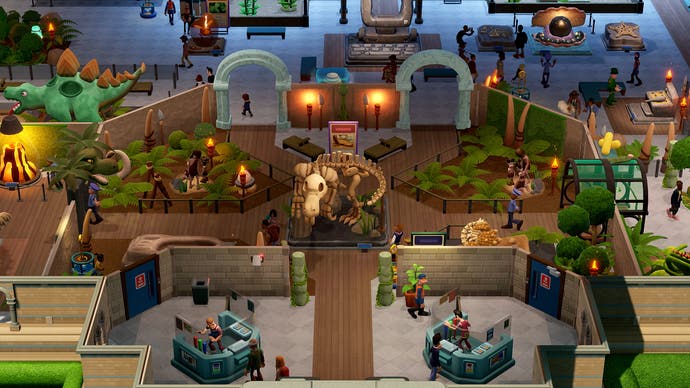
It all plays out with familiar controls, UI, visuals and humour for anyone who's played a previous Two Point game. "Dinosaur bones used to be surrounded by dinosaur," an announcer informed visitors at one point, which made me chuckle. There are plenty of tiny details to admire: cute animations of tourists decked out in floral shirts as they snap pictures, donate and learn, or even parents handing their children food.
"We always want to learn from our previous games," says Koehler. "We spent a lot of time testing and iterating, working with our players to make sure the controls make sense to people. We didn't want to reinvent what works for everyone... but I think it did allow us to get to the mechanics and core systems quicker. The last thing you want to do is make anything feel unnatural for our players."
Two Point Museum will offer expanded customisation tools and more creative freedom, largely due to room requirements no longer causing a hindrance. More objectives will also be offered after reaching a three-star rank on any level, to keep players going longer and provide incentives to return to previously completed levels.
It's clear Two Point Museum is as thorough in its execution as it is charmingly funny. Even after a brief demo, it had me wide-eyed with wonder as to what could possibly happen next. And isn't that what the joy of museums, and of discovery, is all about?
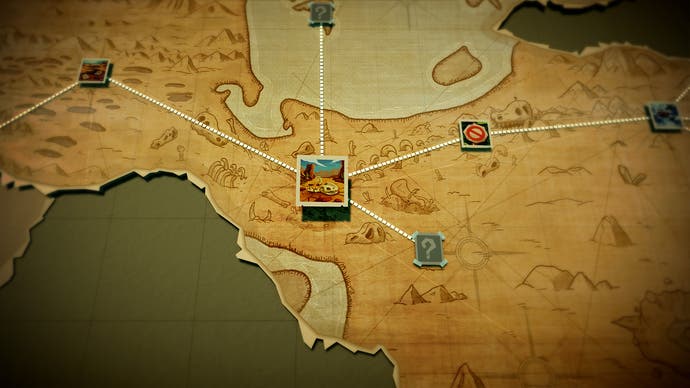
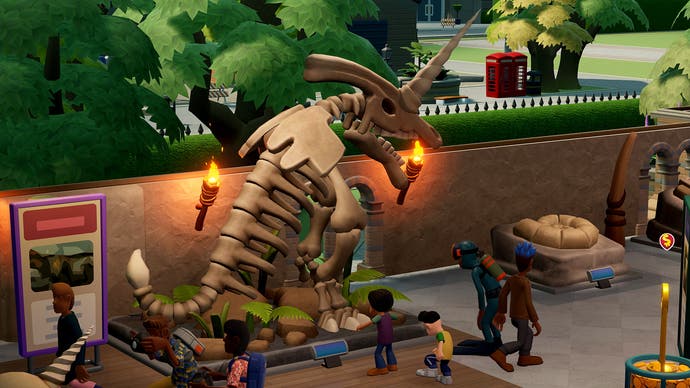
Really, it comes back to that depth of creativity from the studio. "It's very much an open process," says Huskins. "Everyone on the team is interested in chipping in ideas. You've got artists, designers, coders, producers, all chipping in.
"That's where you get that variety of different things coming from and some of the slightly left-field humour. Everyone's got a different sense of humour in the studio so we put that all in a melting pot."
He continues, discussing the interaction of systems: "We spend a lot of time chatting through this stuff and trying to apply a bit of Occam's razor and going 'do we need this thing? Is this just over-complicating the game if we add this in? Could we merge these two ideas together and this will be a more succinct system that gives us the depth we want?'" From there, the team is careful to gradually ease players in with tutorials, ensuring systems work from the start to hours later.
"Some of our players are extremely casual cosy players, but we also have some very hardcore management simulation players who really min-max it and play a certain style," adds Koehler. "We try ticking all the boxes for everyone, it's a lot of testing. And we don't always get it right, but we just iterate until it feels right."
Indeed, just as Two Point Campus iterated on Two Point Hospital, Two Point Museum looks to be doing the same. Fans of the studio's past work won't be disappointed.


